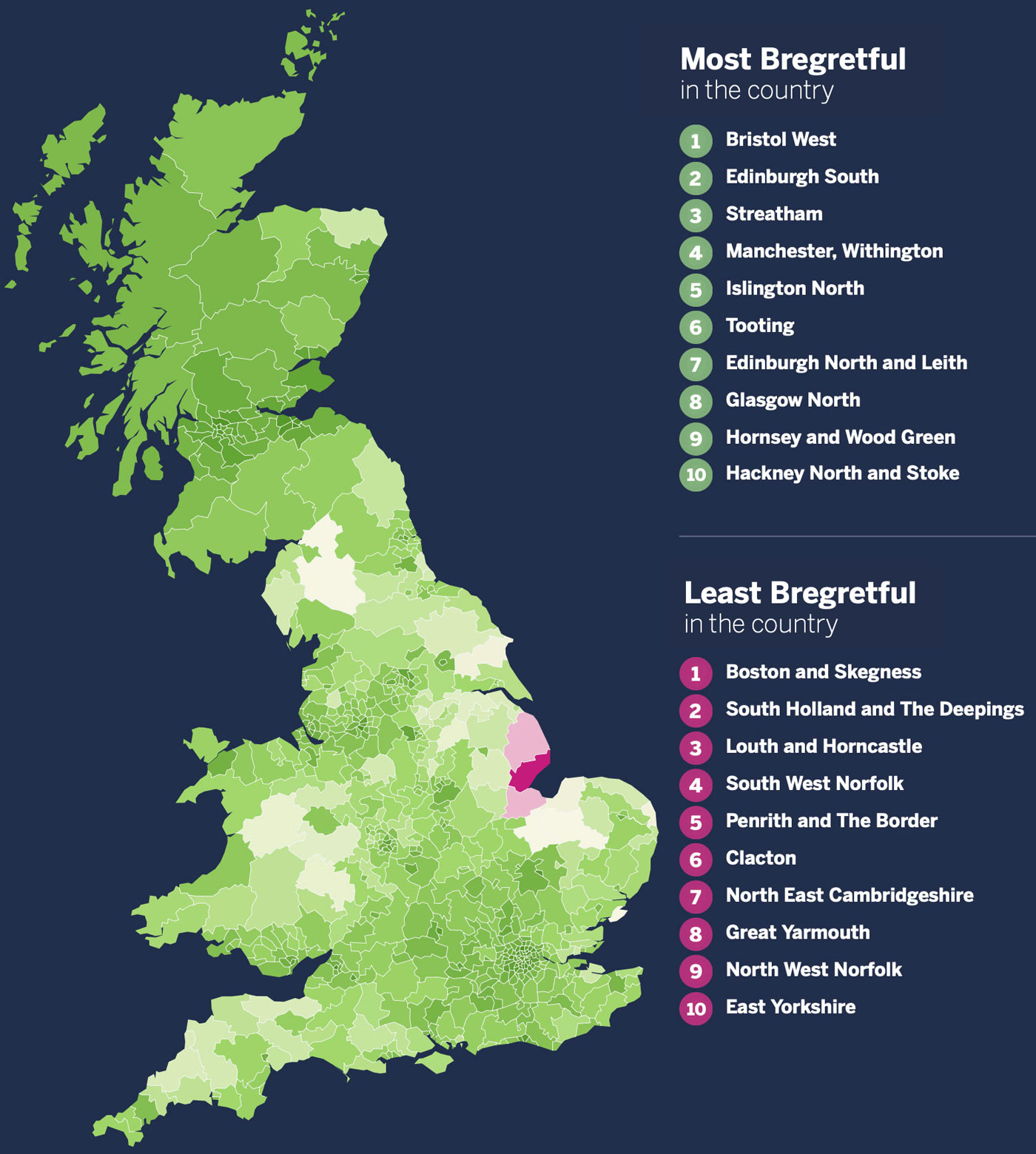The political geography of the UK is on the move again. Barely three years since the realignment of the 2019 General Election, which upended decades-old ideas of traditional Conservative and Labour areas, a new poll by UnHerd and Focaldata reveals a country that is dividing along new and surprising faultlines.
In 2019, our “UnHerd Britain” survey used a statistical technique called MRP to map six big cultural questions onto all 632 constituencies in Britain; this year, UnHerd has again partnered with Focaldata to conduct a survey of 10,000 people across the country. Rather than asking for people’s voting intention, we have investigated the underlying cultural controversies, new and old, that form today’s divisions and alliances and mapped each one down to constituency level.
We put 10 statements in front of voters, covering Brexit, gender ideology, political disillusionment, conspiracy, Net Zero, immigration, the monarchy, the cost-of-living crisis, housing and lockdowns. In each case, respondents chose whether they agreed or disagreed, and how strongly. Focaldata then analysed what the most predictive factors of each question were, including age, gender, working status, vote in the 2019 election and the EU referendum, and calculated estimates for each constituency. This technique, “multilevel regression and post-stratification”, or MRP, has been used with incredible accuracy to predict general elections.
You can look up any constituency, and see where it stands on the big talking points of the day. We will be releasing new results every week.
We begin with Brexit. Three years after we officially left the European Union, respondents were asked whether they agreed or disagreed with the statement, “Britain was wrong to leave the EU”.
The headline result suggests the country has dramatically changed its view since 2019. Focaldata estimates that in every constituency in the country except three, more people agree with the statement than disagree — i.e. tend to think that Brexit was a mistake. The only three outliers are all located along the Wash in Lincolnshire: Louth and Horncastle, Boston and Skegness and South Holland and the Deepings. Of these, only Boston has more people disagreeing than agreeing: it is the only place in the country which doesn’t feel regretful about Brexit.
At the opposite end of the spectrum, in affluent Remainer heartlands such as Bristol West and Edinburgh South, as well as mixed urban areas such as Streatham and Islington North in London, support for Brexit has further dwindled. In Bristol West, for example, where 79% voted to Remain in 2016, only 13% now disagree with the statement that Brexit was a mistake.

The results also reveal a second finding, which is more subtle but the implications of which are profound for how we understand the country. When you compare the UnHerd Britain 2023 results to the 2016 results, it is clear that enthusiasm for Brexit has faded far more dramatically among Left-leaning areas and areas with higher Labour support than in the Tory heartlands. After six years of political argument and Conservative government, the Brexit question no longer cuts across party lines to the same degree: voting for a pro-Brexit party in 2019 is now a better predictor of whether you support Brexit today than whether you supported Brexit in 2016.
James Kanagasooriam, Chief Research Officer at Focaldata, commented: “The dovetailing of the Brexit divide and the country’s left-right axis has been ongoing for some time, but only with the receding waters of a depressed conservative vote has this pattern become so visible. The leave vote is fading and becoming less distinct from the conservative vote.”
By comparing the percentage of those who still support Brexit with the percentage who voted for Brexit in 2016, it is possible to identify the constituencies which have had the most significant change of heart over the past six years. Of the top 20, all but two are Labour seats. Barking in East London for example voted to Leave in 2016 by 60% to 40%; but now 54% of voters in that constituency think Brexit was a mistake. West Ham, Birmingham Ladywood, Dagenham and Rainham, Middlesborough, Walsall — all of these fit a similar profile: poorer areas with a very high proportion of ethnic minority voters. Many of them supported Brexit at the time, and they are now the most disillusioned of all with the project.

Saying Britain was wrong to leave the EU is a different question from whether Britain should rejoin — when asked, voters do not tend to want to re-open the argument. But the overall picture that emerges is that, after the Brexit shock of 2016 and the extraordinary realignment of 2019, the country is gradually reverting to a more traditional Left versus centre-Right divide. The power of the Brexit question to make people rethink their fundamental political perspective is receding into history.
Disclaimer
Some of the posts we share are controversial and we do not necessarily agree with them in the whole extend. Sometimes we agree with the content or part of it but we do not agree with the narration or language. Nevertheless we find them somehow interesting, valuable and/or informative or we share them, because we strongly believe in freedom of speech, free press and journalism. We strongly encourage you to have a critical approach to all the content, do your own research and analysis to build your own opinion.
We would be glad to have your feedback.
Source: UnHerd Read the original article here: https://unherd.com/



